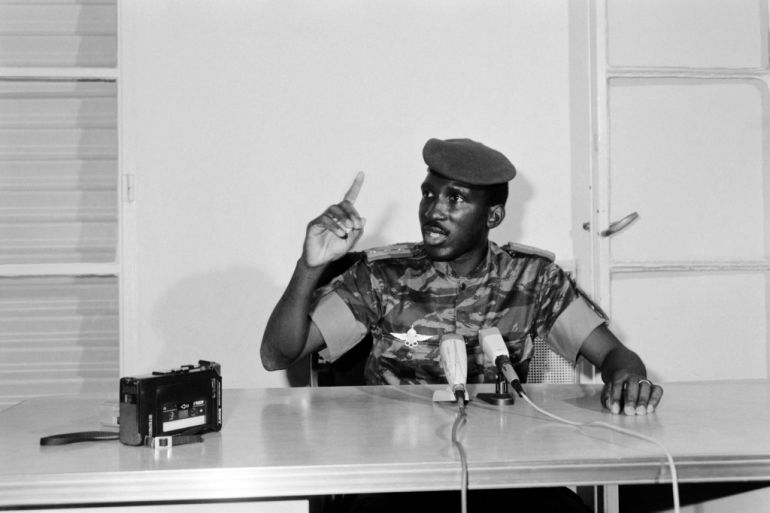Burkina Faso: Trial for murder of former leader Sankara continues
Prosecutors are seeking a 30-year sentence for ex-president Blaise Compaore over the assassination of his predecessor.

The trial for the October 1987 assassination of former Burkina Faso President Thomas Sankara and his colleagues is to resume on Tuesday.
Military prosecutors in Burkina Faso are requesting 30 years in jail for former President Blaise Compaore over the murder of his predecessor.
Keep reading
list of 4 itemsBurkinabe ex-leader Compaore to snub Sankara assassination trial
Burkinabe ex-President Compaore charged in Thomas Sankara murder
Burkinabe prosecutors seek 30 years for Compaore in murder trial
The trial was suspended for three weeks because a Constitutional Court verdict linked to the case was pending.
The court had been previously asked to find Compaore guilty in absentia of an “attack on state security”, “concealment of a corpse” and “complicity in a murder”.
In 1983, Sankara came to power as a 33-year-old army captain, and the following year, he changed the country’s name from Upper Volta to Burkina Faso, which means “land of the honest men”.
He enacted a string of sweeping economic and social policies, including nationalisations, public housing and a ban on female genital mutilation, polygamy and forced marriages.
A Marxist-Leninist, he railed against imperialism and colonialism, often angering Western leaders but gaining followers across the continent and beyond.
On October 15, 1987, Sankara and 12 of his colleagues were gunned down by a hit squad at a meeting of the ruling National Revolutionary Council.
Their assassination coincided with a coup that brought Sankara’s former comrade-in-arms, Compaore, to power. He ruled for 27 years before being deposed by a popular uprising in 2014 and fleeing to the neighbouring Ivory Coast.
Fourteen accused
Fourteen people stand accused in the trial, 12 of them appearing in court. Compaore is accused of being the main sponsor behind the killing.
The prosecution requested 30 years in jail for the commander of Compaore’s guard, Hyacinth Kafando, who is suspected of having led the hit squad.
Five other defendants are facing sentences ranging from three to 20 years, while another faces an 11-year suspended sentence.
The court was asked to acquit three of the accused due to a lack of evidence, and two due to the statute of limitations.
Days before the trial opened on October 11, lawyers for Compaore announced he would not be attending a “political trial” flawed by irregularities, and insisted he enjoyed immunity as a former head of state.
Burkina Faso has long been burdened by silence over the assassination – during Compaore’s long time in office, the subject was taboo – and many are angry that the killers have gone unpunished.